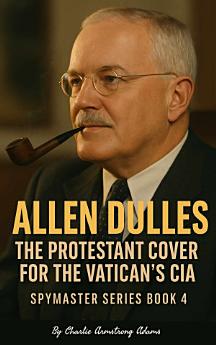Allen Dulles – The Protestant Cover for the Vatican’s CIA
About this ebook
(Spymasters Series, Book 4)
The Cold War was more than a clash of superpowers—it was a hidden crusade.
Behind the headlines of coups, assassinations, and covert wars stood Allen Dulles, the longest-serving director of the CIA. Outwardly, he was the epitome of America's Protestant establishment: Princeton-educated, Wall Street-groomed, and cloaked in Presbyterian respectability. But beneath the surface, Dulles functioned as the chief cooperator of the Vatican's anti-communist crusade, using the CIA as the instrument of a religious as well as political war.
This explosive volume uncovers how Dulles's Protestant identity served as the perfect mask for Vatican-aligned operations:
Installing Ngo Dinh Diem in Vietnam as Rome's chosen strongman
Toppling governments in Iran and Guatemala with Vatican blessing
Engineering the Bay of Pigs invasion, framed as a holy war against Castro
Managing the Warren Commission to conceal deeper truths about Kennedy's assassination
At the heart of the narrative is the clash between Allen Dulles and John F. Kennedy. While Dulles cooperated with the Vatican–CIA bloc, Kennedy became the Catholic resistor, declaring in his famous Houston speech that "no pope shall command a president." This defiance placed him in direct opposition to Dulles, Cardinal Spellman, and the hidden networks that sought to control America's destiny.
Drawing on history, theology, and intelligence archives, this book reveals the architecture of secret power—where Wall Street, Langley, and Rome fused into a single shadow empire. It is a story of masks and hands, of a Protestant spymaster who gave cover to Catholic ambition, and of the president who resisted—until Dallas.
For readers of political thrillers, secret history, and Cold War studies, Allen Dulles – The Protestant Cover for the Vatican's CIA! opens a door into the unseen war that shaped the twentieth century.
About the author
Charlie Armstrong Adams is an independent researcher and writer focused on intelligence history, covert operations, and state power. His works explore the hidden intersections between surveillance, religion, and geopolitics, drawing connections from Cold War espionage to modern digital control systems. With a style that blends investigative detail and historical analysis, Adams aims to expose how secrecy, ideology, and psychological warfare shape both governments and everyday life.









